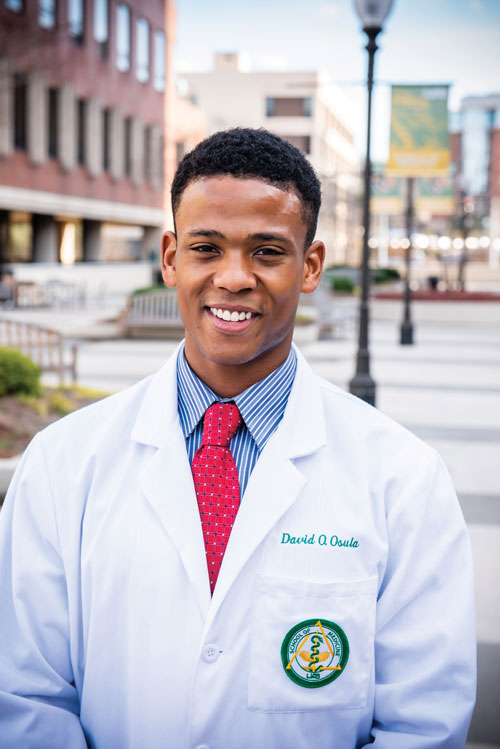Summer 2019, Vol 45, Issue 1, School of Medicine Magazine; By Rosalind Fournier
*The following is an excerpt from the full article, available HERE.
As medical training becomes more team-oriented, medical students are expected to learn to be not only skilled clinicians but also effective leaders. National medical and health care organizations gave several members of the 2019 graduating class unique opportunities to hone their leadership skills.
Making a Mentor
David Osula, who matched in the internal medicine residency at the University of Texas Southwestern Medical School, has never forgotten the mentors who encouraged him, advised him, and helped him carve his own path. One is his father, who exemplifies for Osula what it means to have a strong work ethic and character. Another is a friend and pastor Osula met in college. “He shared with me one of my favorite pieces of advice I’ve ever received: Let your purpose be bigger than your person.”
Those words resonated with Osula, who has dedicated countless hours to paying it forward. In 2016, the Albert Schweitzer Fellowship program recognized his dedication to service by naming him one of the first Schweitzer Fellows of the then newly formed Alabama Chapter.

The Schweitzer Fellowship challenges graduate students to spend at least a year addressing social factors that impact public health. For Osula, mentorship—particularly on a large scale, with a program that could continue after he was gone—was the obvious choice. During his first year of medical school, he started a mentorship program at Carver High School’s Academy of Health Sciences, which fosters interest in health care careers among high school students, and recruited other School of Medicine students to join him. The mentors conduct workshops with the students and talk with them one-on-one about life challenges and career aspirations.
“I remember times in my own life when I wanted to do something but didn’t know how to get there, because I hadn’t walked that path before,” he says. “It’s so valuable to have someone who has been there to talk you through it.”
Karla Williams, M.D., faculty advisor for the School of Medicine Chapter of the Birmingham Academy of Health Sciences, says Osula’s commitment stood out from the beginning. “He has a passion for helping those coming up after him and letting them know that having success in whatever field you choose is attainable,” Williams notes. Williams says they hope to expand the Carver mentorship program to other high schools and recruit student mentors from other health professions schools, particularly nursing.
Osula traveled farther for another outreach initiative when he studied abroad in Peru this past February. While there, he worked with an infectious disease physician at a local hospital and treated patients at several free primary care clinics. “I wanted to be exposed to a different type of health care experience than I might see here at UAB,” he says. “I also wanted to develop my Spanish-speaking skills; that’s important to me because of the growing population of Spanish-speaking patients here in the U.S.”
In the midst of so much activity, Osula married Sarah Bowhay this past spring. She completed a master’s degree in clinical laboratory science and will begin her career in Dallas while Osula conducts his residency.
As for the mentorship program he began at Carver, he retains an advisory role. “We pass the leadership baton each year to a new group of students,” he says. “So I basically advise in terms of vision—here are some things we should think about; here are some goals; these are some things we could do based on past experiences. But I plan to be involved with it in some respect, even from afar.”



